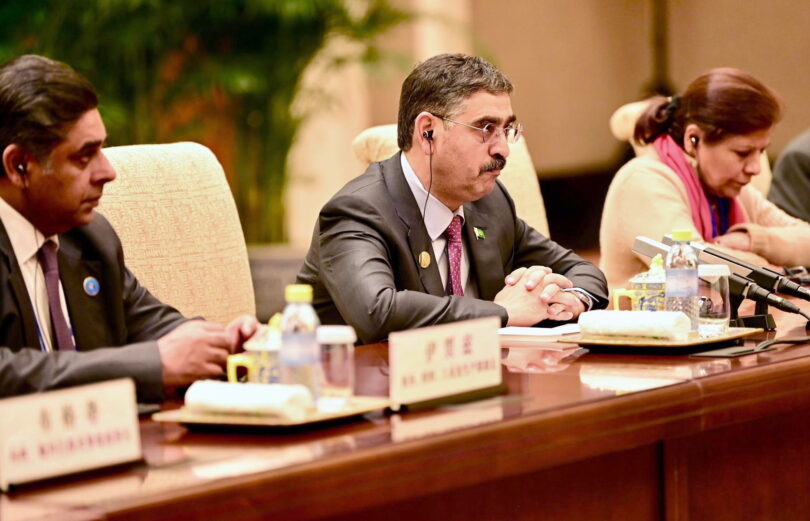BEIJING (APP): Caretaker Prime Minister Anwaar-ul-Haq Kakar on Wednesday said Pakistan was committed to working with China and other regional partners in achieving the ideals of an open global economy and promoting connectivity on a trans-continental scale.
“With shared responsibility and by embracing the vision of working together, we can create a brighter, peaceful, and sustainable future for ourselves and for our generations,” he said in his address at the high-level event of the Third Belt and Road Forum (BRF) on ‘Connectivity in an Open Global Economy’. The two-day forum, which marked the 10 years of the multi-billion dollar cross-regional Belt and Road Initiative, kicked off in China’s capital Beijing with representatives from 140 countries in attendance.
PM Kakar said Pakistan endorsed China’s vision of global connectivity and also looked forward to joining hands with other partners across borders and regions to materialize the projects. “I am hopeful that together we can shape a world with the bonds that unite us together, rather than the forces that divide us,” he said.
The prime minister congratulated President Xi Jinping for his revolutionary idea of the Belt and Road Initiative launched 10 years ago that proved instrumental in bringing common development and shared prosperity. He termed enhanced connectivity a profound factor in development and progress in the modern age of globalization.
“The BRI’s concept of shared future for mankind is not about road and railway infrastructure, but also to create linkages among civilizations and nations,” he said. He mentioned that the world faced a number of challenges including post-pandemic effects, the divide between the developed and the impoverished, peace, and food security.
Kakar highlighted that BRI’s flagship project China-Pakistan Economic Corridor (CPEC) played a crucial role in generating new economic opportunities in Pakistan. Underscoring its salience for Pakistan’s robust economic development, he endorsed the Chinese proposal for developing CPEC as a corridor of growth, innovation, livelihood, green economy, openness, and inclusiveness.
The prime minister underlined the need for a united global response to address complex transnational challenges faced by humankind and to prevent backsliding on the gains achieved under the UN Sustainable Development Goals and 2030 Agenda. He emphasised the urgency of addressing infrastructure gaps in the developing world by investing in transportation, energy, and digital economy.
In Pakistan, he said CPEC’s 50 projects worth $25 billion investment resulted in the creation of modern highways, seaports, airports, and rapid mass transit systems. He said the government of Pakistan had taken steps to make the country a trade hub by connecting Gwadar with the landlocked countries, thus opening new vistas to the west and beyond.
Kakar expressed confidence that as CPEC crossed its decade of launch, the next phase would be poised to accommodate rural farmers, students, and small tradesmen and ensure improvement in living standards, poverty alleviation, and jobs creation. He said Pakistan’s collaboration with China in the information technology sector and CPEC’s green corridor would ensure modernization, food security, and agricultural and environmental protection.
“This vision promotes cooperation, collective security, inclusive and sustainable development, and a balanced eco-system as the only way to address global challenges,” he said. The BRF was opened by Chinese President Xi Jinping this morning where he highlighted the concept of working with all participants to draw a new blueprint for high-quality Belt and Road cooperation.
Xi said China looks forward to strengthening ties, engaging in dialogues, forging new partnerships, and promoting regional connectivity for a brighter future. “The BRF is about planning together, building together, and benefiting together,” he said, adding that the project had established a new framework for international cooperation.
PM highlights govt’s business friendly, pro-investment initiatives: Caretaker Prime Minister Anwaar-ul-Haq Kakar said that the government was taking business-friendly and pro-investment initiatives to bring about the economic development in the country. The prime minister, in a meeting with a delegation of East Sea Group led by Chairman Fang Yulong, highlighted pro-business policies of the government.
The meeting took place on the sidelines of the Belt and Road Forum held here. He said the government was encouraging the private sector and providing a conducive atmosphere to enable it play an effective role for country’s economic development. Fang Yulong told the prime minister that East Sea Group was making investments in Gwadar Free Zone and refinery sector and that the Chinese firms were taking keen interest in increasing their investment in the country.
Prime Minister Kakar welcomed the East Sea Group’s interest in investment in Pakistan and called Gwadar a key factor for Pakistan’s economic development and China Pakistan Economic Corridor (CPEC). He said that Pakistan and China were time-tested friends as the latter stood by the former in every difficult time. Later, the prime minister wrote on X that in the meeting they discussed Pakistan’s business-friendly policies, private sector growth, and deepening Pak-China economic ties.
China’s investment in Gwadar Free Zone is a testament to our enduring friendship, he remarked.
PM joins world leaders in Beijing as Belt & Road Forum kicks off: Caretaker Prime Minister Anwaar-ul-Haq Kakar on Wednesday joined world leaders in China as the Third Belt and Road Forum (BRF) for International Cooperation kicked off here in Beijing. Chinese President Xi opened the Forum with representatives from about 140 nations in attendance.
Besides PM Kakar, the dignitaries at the forum included Russian President Vladimir Putin, Ethiopian Prime Minister Abiy Ahmed, Sri Lankan President RanilWickremesinghe, Republic of Congo President Denis SassouNguesso, Papua New Guinean Prime Minister James Marape, Cambodian Prime Minister Hun Manet, Argentina’s President Alberto Fernandez, Hungarian Prime Minister Viktor Orban, and Indonesian President Joko Widodo.
In his opening speech, President Xi highlighted the concept of working with all participants to draw a new blueprint for high-quality Belt and Road cooperation. He said China looks forward to strengthening ties, engaging in dialogues, forging new partnerships, and promoting regional connectivity for a brighter future.
“The BRF is about planning together, building together and benefiting together,” he said, adding that the project had established a new framework for international cooperation. He termed BRF a “humanity’s joint pursuit of development for all”, which he said extended from Eurasia to Africa and Latin America. He said the project had ensured a flow of goods, capital, technology and human resources.
Xi said BRF would inject new impetus to the global economy and mentioned that 20 multilateral cooperation platforms had been established under the BRF besides a large number of other significant projects. Russian President Vladimir Putin said China had proved its mettle during the last 10 years in the implementation of its project of global connectivity. He said Russia supported President Xi’s vision that aimed at ensuring regional connectivity and benefiting nations across the globe.
After the BRF event, PM Kakar will participate in the high-level forum on ‘Connectivity in an Open Global Economy’ and also address the occasion. In the afternoon, he will meet his Chinese counterpart Li Qiang and witness the signing of several memorandums of understanding. The other official engagements of the prime minister include meeting with Secretary of the Communist Party’s Central Commission for Discipline, Li Xi. He will also interact with the heads of Chinese business companies.
PM urges UN Secy General to ask Israel to stop violence against Palestinians: Caretaker Prime Minister Anwaar-ul-Haq Kakar urged the United Nations Secretary-General Antonio Guterres to play a role in stopping Israel’s violence against Palestinians.
The prime minister and the UN’s top diplomat met in Beijing on the sidelines of the Third Belt and Road Forum. “We demand an end to this indiscriminate targeting and urge the international community to act swiftly to stop the violence and hold those responsible accountable,” the prime minister posted on social media platform X after his meeting with Guterres. PM Kakar strongly condemned the Israeli attack on Al-Ahly Al-Mamadany Hospital in Gaza, causing immense civilian casualties. He termed targeting a hospital, a sanctuary for those in need, an “indefensible act of inhumanity”. International humanitarian law gives protection to hospitals and medical personnel, he added.
Pakistan as initial beneficiary appreciates, supports BRI: Pakistan has consistently expressed great appreciation and strong support for the Belt and Road Initiative (BRI) proposed by Chinese President Xi Jinping and was willing to learn from China’s development experience, Caretaker Prime Minister, Anwaar-ul-Haq Kakar said talking to the Chinese media.
Kakar, who was invited to attend the third Belt and Road Forum for International Cooperation in Beijing, said that the Pakistanis valued the great vision embodied in the BRI, which advocated bringing peace and prosperity through economic development. The Pakistani delegation, comprising top-level officials from the economic, industrial, security, and other departments, was eagerly anticipating bilateral discussions with Chinese officials during the visit, engaging in dialogue and interaction with Chinese think tanks and media as well, he said.
Emphasizing the significant accomplishments of the China-Pakistan Economic Corridor (CPEC), an exemplary project of the BRI, Kakar said the CPEC has brought great development and bright prospects to his hometown of southwest Balochistan province. Launched in 2013, the CPEC was a corridor linking the Gwadar port in southwestern Pakistan with Kashgar in northwest China’s Xinjiang Uygur Autonomous Region, which highlights energy, transport and industrial cooperation.
Noting that Pakistan would further strengthen policy communication and coordination with China in the new phase of high-quality development of the CPEC, Kakar said his country would introduce new technologies in fields such as food security and agriculture from China, encourage enterprises to expand trade and further tap bilateral cooperation potential with China. Pakistan will further improve the Special Investment Facilitation Council in a bid to encourage and facilitate Chinese enterprises to invest in sectors such as mining, agriculture and information technology, and create favorable conditions for Chinese businesses operating in Pakistan, he said. Kakar also emphasized that Pakistan places high importance on the safety of Chinese citizens in Pakistan and is willing to further improve security mechanisms for Chinese citizens, making every effort to ensure the safety of Chinese citizens and institutions in Pakistan. Expressing his hope for the two peoples to increase their understanding of each other’s language and culture and further strengthen the friendly relations, he said that Pakistan cherishes the ironclad friendship with China and believes that cooperation with China is full of opportunities.







